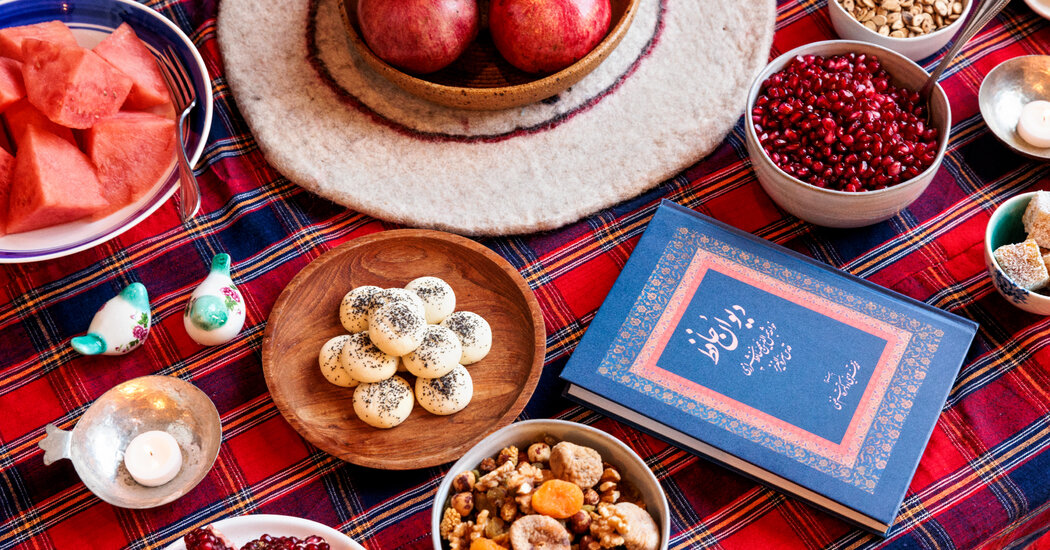
On Shab-e Yalda, the Iranian celebration of the winter solstice, elders take turns reading from a book of poetry by the celebrated 14th-century Persian poet Hafez, and interpret the rhyming couplets as a form of fortunetelling. Their families listen and tell stories by candlelight, sing, laugh and fill the house with light and warmth while gathered around the korsi to graze on trays of delicately cracked clusters of pomegranates, sparkling bowls of their ruby red seeds and cool, crisp watermelon slices.
A korsi is a large, low square table that is heated underneath — by coals in the old days and electric heaters now. The table is draped with blankets, to tuck your legs under to keep them warm and cozy, and surrounded by cushions to lean against. While the use of a korsi is not common outside of Iran, Iranians in the diaspora create similarly inviting setups for their own Yalda celebrations. On this longest and darkest night of the year in the Northern Hemisphere, symbolic foods, pomegranates chief among them, are passed around to welcome back the light and longer days.
The Yalda evening celebrations begin with dinner, but unlike Nowruz meals, there isn’t a set menu. Families typically feast on regional warming stews, rice dishes, ash — thick, hearty Iranian soups — and especially pomegranate-based dishes, such as khoresh morgh naardooni, khoresh-e fesenjoon, and ash-e anar (pomegranate ash).
“Historically, the pomegranate — anar — holds special significance in Persian culture,” said Nader Mehravari, the food research fellow at San Francisco State University’s Center for Iranian Diaspora Studies. “Pomegranates originated in the region of modern-day Iran. From a religious aspect, the pomegranate is considered a heavenly fruit and perhaps the original forbidden fruit. It is also a sign of fertility, light and goodness, which is why it is so auspicious on Yalda night as a symbolic opposing force of darkness.”
This victory of light and goodness over the forces of darkness has been celebrated by Iranians for more than 5,000 years.
According to Dr. Mehravari, the origins of Yalda date back to pre-Zoroastrian Mithraism, the worship of the god of the sun. It is said that Mithra was born on this day, and “Yalda” comes from the Cyrillic word meaning birth or rebirth.
On Yalda, which falls on Dec. 21 this year, it is customary to take refuge from the darkness and remain indoors, and to welcome the new light by staying up as long as possible. It is believed that, with the sun’s triumphant rise, our days will shine brighter and longer with hope and good will.
For his Northern Iranian-inspired dishes at Komaaj, a restaurant and catering company, the Bay Area-based chef Hanif Sadr uses pomegranate in all its forms — seeds, juice, molasses. This year, his Yalda menu will include an interpretation of seerabeh, a traditional Northern Iranian sauce. Seerabeh is tangy, made with walnuts, pomegranate juice (or verjuice), pomegranate seeds, garlic and herbs, and is typically served with fish.
The combination of walnuts and pomegranates is a classic pairing in Iranian cuisine. In this version, Mr. Sadr takes the classic preparation of kaale (uncooked) seerabeh and serves it as a dressing for a crisp salad. Romaine hearts, purple carrots, radishes and orange segments provide the chromatic canvas upon which the pinkish sauce is drizzled.
Khoresh morgh naardooni (pomegranate chicken stew), also called anar mosama, is another celebratory dish to serve on Yalda. The combination of pomegranate molasses and pomegranate seeds in this deeply flavorful stew showcases the various ways pomegranates can be used to achieve layers of flavor. Be mindful that the taste and tartness of pomegranate molasses varies by brand. Before cooking, make sure you taste a little bit of the molasses to get an idea of how tart, bitter or sweet it is.
After dinner, families snack on symbolic foods that are placed on the korsi. The red hue of pomegranates and watermelon flesh represents the rising crimson sun, and the melons, traditionally stored in cool basements in late summer to last until winter, are believed to keep illness at bay in the coming warmer months. A bowl of ajeel — mixed nuts, watermelon seeds and dried fruits — is also set on the korsi for prosperity, alongside hot tea, sweets and fresh seasonal fruits like persimmons.
All of the food, the pomegranates in particular, serves as a joyful reminder that the re-emergence of the sun, light, hope and goodness is only but a night away.



